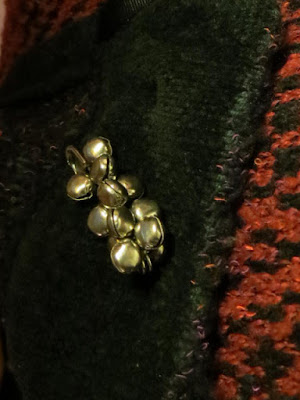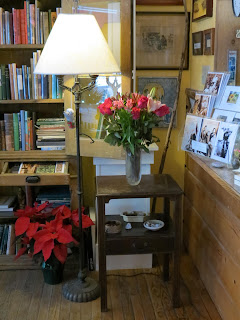 |
| Out in the countryside |
Friends
and strangers stopping in the bookstore the last couple of days have been
shocked to see me underlining phrases in a book. With a pen, no less! I explain
that it’s an old paperback, spine cracked and pages ready to start falling out,
and that some previous studious reader already went through the whole thing
with yellow highlighter. One young man asked, “Are you doing a word search? My
mother does that.” Seems the whole concept of underlining key ideas in a text
had passed him by. But I am of another generation, of course....
The
book I’ve been reading is a little anthology of historical writings on the
American Revolution with an arresting title: The Ambiguity of the American Revolution. The book’s editor, Jack P. Greene, in his excellent introduction, traces the history of our history, as it were –
the different interpretations given over time to the Revolution, starting with
contemporary accounts -- because even in the 1770s, there was no unanimity of
view. Loyalists saw the conflict one way, patriots another, and their
perspectives colored the way they wrote their accounts. John Adams himself said
there were as many American Revolutions as there were colonies and perhaps as
many as individuals in those colonies. Everyone had a slightly different take
on it at the time, and through successive periods of our country’s life new
interpretations have emerged in waves, to be supplanted in their turn by
others. This diversity of perspective is something we often lose sight of, now
that we’ve had two hundred and forty-one years to come -- more or less, in
textbooks if nowhere else -- to agreement on a national narrative.
[See continuation of discussion of this book here.]
[See continuation of discussion of this book here.]
David
Ramsay, a Maryland physician who graduated from the College of New Jersey in
the year of the Stamp Act crisis (1765), eventually wrote of the Patriot cause
and the newly formed United States of America:
The world has not hitherto exhibited so fair an opportunity for promoting social happiness. It is hoped for the honour of human nature, that the result will prove the fallacy of those theories, which suppose that mankind are incapable of self-government.
– from his History of the American Revolution, first published in Philadelphia in1789, an excerpt of which appears in The Ambiguity of the American Revolution
President Abraham Lincoln, during the Civil War, addressing
the crowd at Gettysburg, noted that the crowd that day “met on a great
battlefield of that war,” a war “testing whether that nation, or any nation so
conceived and so dedicated, can long endure.” Far short of three hundred years
old, our country remains an experiment, its success into the future far from
guaranteed.
Freedom
of speech, freedom of assembly, freedom of the press: If the “national
security” entails restricting those freedoms, what “security” do Americans
have? I picked up another book at home this morning, Moyers on America: A
Journalist and His Time, and, opening at random, fell by chance – true story – on
a chapter entitled “Journalism and Democracy.” On the first page of that
chapter, Bill Moyers (one of my heroes) says that after less than two years as
White House press secretary,
It took me a while to get my footing back in journalism. I had to learn all over again that what’s important for the journalist is not how close you are to power but how close you are to reality. ...
I also had to relearn one of journalism’s basic lessons. The job of trying to tell the truth about people whose job it is to hide the truth is almost as complicated and difficult as trying to hide it in the first place.
 |
| The lighter side |
Today
is the 4th of July, and Americans are gathering again, all over the
country, in crowds large and small. We take time out from our ordinary pursuits
to re-read the Declaration of Independence. (In Leelanau County, such readings
usually take place in front of a village post office. See below for Northport event.) The mood of Independence
Day is celebratory. There are parades and marching bands and flags waving in
the breeze and displays of fireworks against the summer night sky.
 |
| Patriotic village gathering |
While
most of us do not see ourselves “met on a battlefield” this July 4, 2017, we
are painfully aware that our country is deeply divided. We are divided not only
on issues, but on our most basic core value, freedom. What does ‘freedom’
mean, and how is it best protected? Beneath all the posturing and tweets and
insults, that is the crucial question.
Coming
fast upon the heels of the first question, however, is another: How can the
question about freedom be answered in a civilized manner?
If
we cannot agree on an answer to the second question, the first becomes moot,
because when civil discourse gives way to hate, attacks on freedoms
proliferate, and repression ensues, and when hate gives way to violence, life
and liberty both fall victim.
Can
the current trend of incivility and increasing repression be reversed? Can our
freedoms endure? It’s worth taking a few minutes to ponder these questions on
this day of air shows and hot dogs and sparklers.
 |
| Eternal vigilance! |


